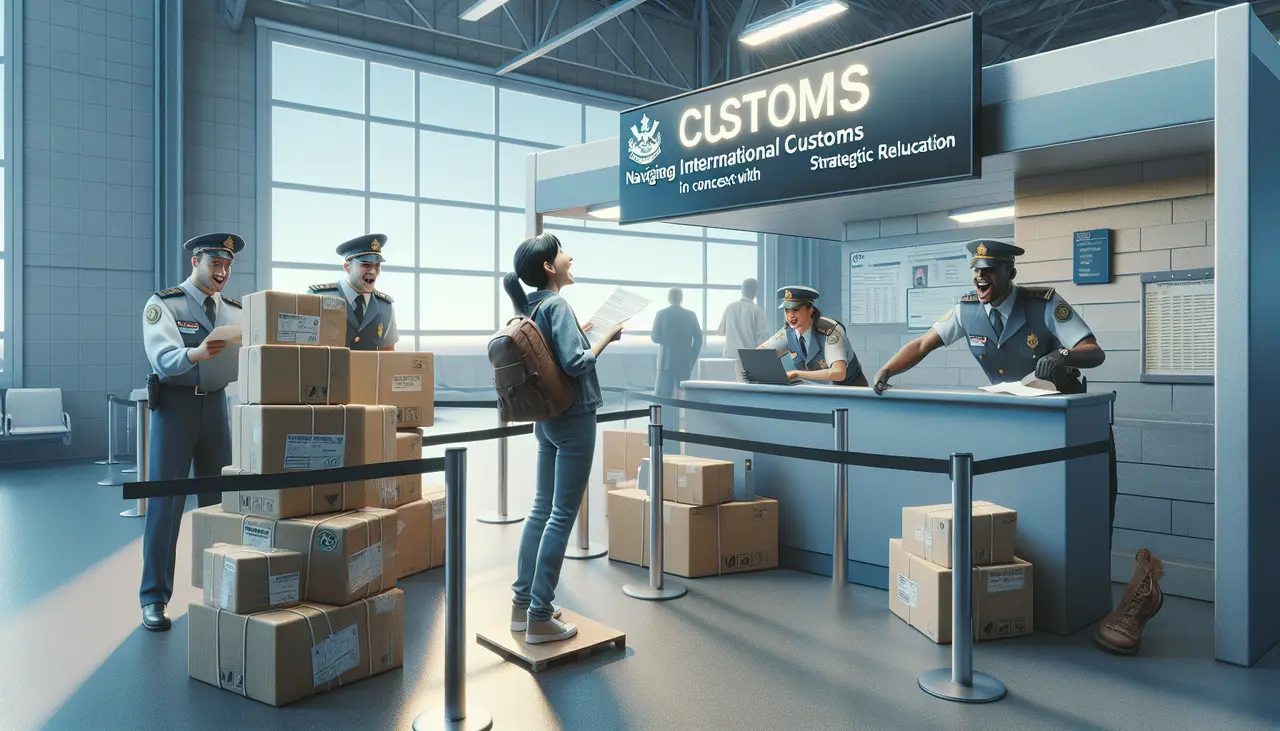Introduction to International Strategic Relocation
Moving between countries isn’t just about packing bags and booking flights. It involves a strategic process known as international strategic relocation. At its core, this process is about planning and executing a move across borders with minimal hassle and maximum efficiency. Whether you’re moving for a job, lifestyle change, or personal reasons, understanding the intricacies of international customs is crucial. Every country has its own set of rules and regulations for incoming residents and goods. This means paperwork, legal requirements, and often, a bit of patience. But don’t let that deter you. With the right approach, moving across borders can be a smooth and even exciting experience. The key is to arm yourself with knowledge and prepare well in advance. In this guide, we’ll break down essential tips to navigate international customs, ensuring your relocation strategy is solid from the get-go. From understanding what you can and cannot bring into a new country to getting your documents in order, we’re here to help make your international move as seamless as possible.
Understanding Customs Regulations Around the World
Customs rules can seem like a maze, but remember, each country sets its own. This means what’s okay in one place might not fly in another. Key is to do your homework before you go. Most countries have websites where they list their customs rules. Look for things like what goods are banned, if there are limits on items like alcohol or tobacco, and what you must declare. Ignorance won’t get you a pass, and saying “I didn’t know” won’t cut it. Also, some countries have strict rules about medication or food products coming in. Make sure you’ve got prescriptions for any meds you’re carrying, and double-check those food item rules. A big part of this is also understanding the why behind the rules. It’s not just about taxes; it’s also about protecting local industries and preventing the spread of disease. Keep in mind, if you’re moving or staying abroad for a long time, you might be able to bring more stuff tax-free. But, rules on this vary widely. Check out specifics for returning residents or long-term visas. Playing by the rules makes for smooth sailing—or flying, as the case may be.
Preparing Your Documentation: What You Need
Getting your documents in order is key to a hassle-free move across borders. You’ll need a valid passport, of course. Then comes visas. Depending on where you’re heading, the type you’ll need varies. Work, residence, or maybe a student visa? Check the country’s immigration website for specifics. Next, work permits. Not all places require them, but many do. Again, the destination country’s official sites tell you what’s needed. Birth certificates, marriage certificates, and drivers licenses should be not just brought but translated if they’re not in the country’s primary language. Medical records, vaccination certificates, and pet documents, if you’re bringing furry friends, are also on the list. Each of these documents plays a critical part in your move. Missing one can set you back more than just time. It can lead to denied entries or unnecessary headaches. Double-check what you need, make copies, and keep them safe. That way, you’re not just prepared; you’re bulletproof.
Packing Strategies for International Moves
When packing for an international move, think like a minimalist. Your goal is to take only what you need. Start by creating a list of essentials. These are items you can’t live without, like important documents, medications, and a few clothes. Remember, the more you take, the more you pay. Shipping costs are based on weight and volume, so every extra item adds up. Next, consider what you can buy there. Often, it’s cheaper and easier to purchase bulky items like furniture and appliances in your new country. For what you do decide to take, use sturdy, waterproof packaging. Label everything clearly in English and, if possible, in the language of your destination country. This makes customs processing smoother. Also, keep an inventory list. This is crucial for both insurance purposes and to keep track of your belongings during the move. Lastly, research prohibited items. Each country has its own rules about what can and cannot be brought in. Bringing something that’s not allowed can cause delays and complications. A bit of planning and smart packing can make your international move much less stressful.
Navigating Customs Fees and Duties
When moving internationally, dealing with customs fees and duties can seem like navigating a minefield blindfolded. But, keeping a few key points in mind can turn this part of your relocation into a smooth operation. First off, customs fees and duties are what governments charge for moving goods across borders. The rates and rules can vary wildly from country to country, so it’s critical to do your homework.
For starters, understand the value limit for goods you can bring into a country before you get hit with charges. Many countries allow a certain value of goods as a duty-free allowance. Anything above this value, and you’re looking at extra costs. For personal belongings and household items you’re bringing for your relocation, different rules can apply. Often, used personal items can be brought in duty-free, but this is not a blanket rule for all countries.
Next, classify your goods correctly. Each item has a specific classification code, and messing this up can mean unnecessary fees or delays. If you’re unsure, consult with a customs broker or the local customs authority’s website.
Also, keep all your documents organized and readily available. This includes your passport, visa, detailed inventory of your items, and receipts for any new purchases. Customs officials can ask for any of these, and being prepared speeds up the process.
Lastly, consider the timing of your shipment. Some countries have specific windows when moving goods are easier or cheaper. Planning your move around these times can save you from a headache.
Remember, knowledge is power when dealing with customs. A little research and preparation go a long way in making your strategic relocation as seamless as possible.
Tips for Dealing with Customs Officials
When moving across borders, dealing with customs officials is inevitable. But there’s no need to sweat it. Approach this with a straightforward plan and you’ll navigate through smoothly. First off, always be upfront and honest. Customs officials deal with half-truths all day, so a clear and honest account stands out. Next, keep all your documents organized and readily accessible. This includes your passport, visa, and any other paperwork related to your move or the items you’re bringing with you. A delay in producing these can raise unnecessary suspicion or delay your process. Also, understanding the rules of what you can and cannot bring into a country is crucial. Every country has its own set of restricted items. Familiarize yourself with these regulations to avoid any hassles. Import taxes can catch you off-guard. Be ready to possibly pay fees on certain items you’re bringing in, depending on their value and the country’s laws. It’s part of the game. Lastly, keep calm and patient. Even if you’re held up, maintaining a positive attitude goes a long way. Remember, customs is just one step in your journey. Handle it smartly, and you’ll be on your way.
How to Use a Customs Broker for Your Relocation
When moving across borders, you might want to use a customs broker. Think of them as your personal guide through the maze of international trade laws. A customs broker is someone licensed by the country you’re moving to, specialized in understanding all those complex rules and paperwork that come with importing your belongings. Here’s how using one can simplify your relocation:
First, they save you time. Instead of you trying to figure out what forms to fill out or what fees to pay, a customs broker does all this legwork for you.
Second, they help you avoid costly mistakes. Misunderstanding customs regulations can result in hefty fines or even your items being held up at the border. A customs broker uses their expertise to prevent these errors.
Lastly, they can offer advice on how to save money. Customs brokers are familiar with duty reliefs and tax exemptions you might not know about.
In short, hiring a customs broker for your relocation might seem like an extra expense at first, but their expertise can actually save you time, protect you from making expensive mistakes, and even help you save money on your move. Remember, moving is stressful enough without having to become an expert in international customs regulations overnight.
Relocating Vehicles and Pets: Special Considerations
Relocating vehicles and pets across borders isn’t just about packing them up and moving. It requires careful planning and knowledge of regulations that vary from country to country. For vehicles, you’ll need to check the emission standards and vehicle age restrictions of your destination country. Some countries have strict rules against importing older cars or those that don’t meet specific emission levels. Also, be ready for paperwork. Expect to fill out import and customs documents and possibly pay import duties or taxes.
Now, for your furry or feathered friends, the process can get even trickier. Countries have their own set of health, vaccination, and quarantine regulations for pets to prevent the spread of diseases. Generally, you’ll need a recent health certificate from a veterinarian and proof of vaccinations, especially for rabies. Some countries require pets to stay in quarantine for a set period upon arrival. This is both for the safety of your pet and other animals in the country.
In a nutshell, when relocating vehicles and pets, do your homework well in advance. Contact the embassy of your destination country or consult with relocation experts. Being prepared will save you time, money, and stress, making your strategic relocation smoother. Plus, it ensures your pets and vehicles arrive safely and legally, ready for your new adventure together.
Common Pitfalls to Avoid in International Customs
When you’re moving across borders, customs can trip you up if you’re not careful. Avoid these common pitfalls to ensure your strategic relocation goes smoothly. First, not declaring everything can land you in hot water. The consequences range from fines to your items being confiscated, so be honest and thorough. Next, underestimating the value of your goods is another mistake. Customs officials are savvy and can spot this a mile away, leading to penalties or delays. Also, failing to provide the necessary paperwork is asking for trouble. This includes permits, receipts, and any other documents required by the country you’re entering. And don’t bring prohibited items. Every country has a list of banned goods, from food products to cultural artifacts. Check this list before packing. Lastly, waiting until the last minute to learn about the customs process can lead to a headache. Start your research early and prepare accordingly. Steering clear of these pitfalls will make your transition much smoother.
Final Thoughts: Ensuring a Smooth Transition Across Borders
Moving across borders? Keep it simple. Remember, every country has its own set of rules. To avoid any mess, do your homework. Key points? Learn about the new country’s customs and tax laws. Check if you need to pay taxes on your belongings or if there are restricted items. Packing smart is also crucial. Label everything clearly and make an inventory. It might seem tedious, but it’ll save you time and stress later.
Next up, pick a reliable moving company that knows international moves. They should understand customs protocols to prevent your items from being held up.
Communication is your best friend here. Stay in touch with your movers and local authorities. Misunderstandings can lead to delays or extra charges.
Lastly, patience is your ally. Customs clearance doesn’t happen overnight. There might be delays. Stay calm and prepared for some waiting.
Follow these steps, and you’ll find moving across borders less daunting. It’s all about planning, understanding, and having the right attitude.




